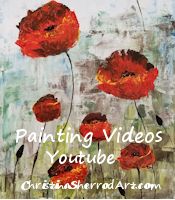|
|
| HOME SEW CRAFTS DECOR SHOP |
|
SPRING CHEER HOSPITAL QUILT
|
| lessons holiday patterns sewing patterns |

|
|
Woven Quilt Block Pattern46.5" x 46.5" fits hospital bedhospital, daybed or lap quilt |
"Woven" Hospital QuiltMake In A Day Quilt Wonderful pattern for beginners. 6" blocks plus borders are all that is needed to create this very easy-to-make quilt. The pattern uses three different fabrics to create a look that resembles a weave. 49 blocks make up the quilt - 7 rows of 7 blocks (squares). Use this quilt on a hospital bed for added warmth and cheer, or as a lap quilt when sitting in chairs or wheelchairs. It is perfect for a hospital bed due to its size. It covers the legs, but doesn't come up too high on the bed. Because it doesn't get in the way of tubing, there is less chance of it getting dirty while in use in the hospital. I draped it over a day bed in my guest room to add color to the room. All patterns, images and text © Christina Sherrod of CraftAndFabricLinks.com unless otherwise noted. Finished Quilt Size
46.5" x 46.5"
|
Basic Layout
|
Supplies*NOTE: 42" - 44" is a common width for quilt fabric. You will need (after shrinkage) a width of at least 39" to get 6 squares (blocks) per strip (6x6.5=39). |
|
|
|
|
|
Binding: Cut binding either 1.5" wide or 2" wide (your preference), and long enough to go all the way around your quilt - about 200 inches. Binding can be made from scrap fabric, or it can be purchased. Batting: You will need a 46.5" x 46.5" piece of batting (cut larger; then trim later to fit).
Quilt Backing: 46.5" x 46.5" piece of fabric for the quilt back (cut larger; then trim later to fit). |
PRE-WASH, DRY, & PRESS FABRIC BEFORE USINGYour fabric will shrink, so pre-wash, dry and press before using. |
Cutting Instructions
For colors two and three, cut three strips of fabric 6.5" x w.o.f. Cut all strips into 4.5" squares. For color one, you will need a total of 25 squares (blocks). For colors two and three you will need a total of 12 squares of each color. |
BordersFrom color one, cut four squares, each measuring 2.5" x 2.5". From color two: cut 3 strips, each 2.5" x w.o.f. Cut strips into pieces that measure 2.5" x 6.5". You will need 14 pieces. From color three: cut 3 strips, each 2.5" x w.o.f. Cut strips into pieces that measure 2.5" x 6.5". You will need 14 pieces. |
Sewing Instructionsuse 1/4" seam allowanceIron between each step. Read through all directions completely before beginning. Using 1/4" seam allowances, sew the squares together as shown below. The top three rows show the rows before they are stitched together; the lower section shows the rows stitched together. It is easiest to assemble the squares into one row at a time. You can create horizontal or vertical rows. We show the top three horizontal rows below. Follow the image at the top of this page to complete the remaining rows. After your rows are created, sew the rows together. TIP: Iron all squares before sewing them into rows. Iron the rows before sewing them together. It works best to press the seams in opposite directions. In other words, if row one has seams pressed to the left, press the seams of row two to the right. That way, when you sew the rows together, it is easier to match corners more precisely. Refer to General Quilting Instructions and Assemble And Bind A Quilt for for additional instructions on stitching quilt blocks.
|
Layering / Quilting
Refer to General Quilting Instructions and Assemble And Bind A Quilt for for additional instructions on stitching quilt blocks.
|
note on backing
My flannel was not wide enough to use for backing. I pieced it across one end. This worked fine in my opinion; the seam is hardly noticeable. Refer to the following photo. |
Quick Reference |
Learn To Paint!free video tutorialsVisit my youtube channel. Free videos with step by step instructions. Paint beautiful paintings for your home. |
Please ShareI rely on advertising to keep my site free. Please share with friends. |
Privacy Policy & Terms Of UseBy using our website, you expressly consent to our Privacy Policy and Terms & Conditions. All Patterns, images and instructions are copyright protected. |
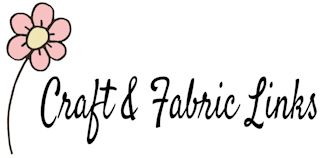
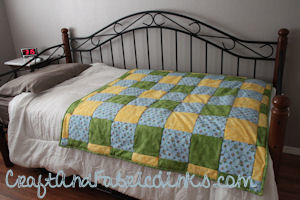
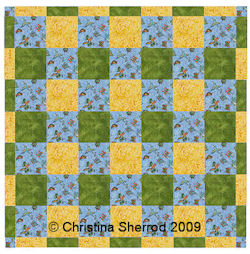 The photo at the right shows my quilt after all blocks were stitched together, and the border had been added. After this photo was taken I assembled my quilt, then added binding that I cut from the green print.
The photo at the right shows my quilt after all blocks were stitched together, and the border had been added. After this photo was taken I assembled my quilt, then added binding that I cut from the green print.


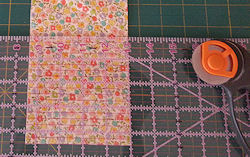 All strips of fabric will be cut 6.5" x w.o.f. (width of fabric). I cut my strips using a large sewing ruler and a rotary cutter. To make it go more quickly, I fold the fabric in half, lining up selvages, before cutting. When I computed fabric yardage, I assumed you could get at least 6 blocks per strip. Your pre-shrunk fabric would need to be at least 36" wide (6x6.5=39).
All strips of fabric will be cut 6.5" x w.o.f. (width of fabric). I cut my strips using a large sewing ruler and a rotary cutter. To make it go more quickly, I fold the fabric in half, lining up selvages, before cutting. When I computed fabric yardage, I assumed you could get at least 6 blocks per strip. Your pre-shrunk fabric would need to be at least 36" wide (6x6.5=39).
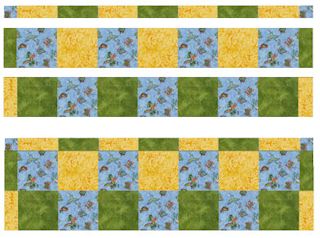
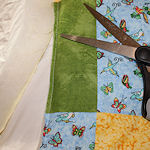 You can now stitch the three layers together. Lay down the backing, right side down. Then lay down the batting. Then lay down the top layer, right side up. The lower layers might extend beyond the sides of the top layer if they were cut a bit larger. That's fine; lower layers can be trimmed after the layers are stitched together. Baste the layers together, using pins or basting stitches. Place pins fairly close together. I pin where corners come together, and around outside edges. Then hand or machine baste around the outer edge, stitching all three layers together around all four sides. Trim the basting and backing to fit the top layer. The following photo shows the top layer with the lower layers showing on the sides (I pulled them to the side for the photo). When all layers are basted together, you are ready to hand quilt, machine quilt or tie layers. I chose to tie the layers together using embroidery floss.
You can now stitch the three layers together. Lay down the backing, right side down. Then lay down the batting. Then lay down the top layer, right side up. The lower layers might extend beyond the sides of the top layer if they were cut a bit larger. That's fine; lower layers can be trimmed after the layers are stitched together. Baste the layers together, using pins or basting stitches. Place pins fairly close together. I pin where corners come together, and around outside edges. Then hand or machine baste around the outer edge, stitching all three layers together around all four sides. Trim the basting and backing to fit the top layer. The following photo shows the top layer with the lower layers showing on the sides (I pulled them to the side for the photo). When all layers are basted together, you are ready to hand quilt, machine quilt or tie layers. I chose to tie the layers together using embroidery floss.
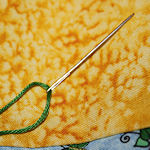
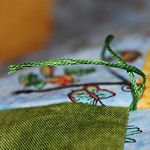
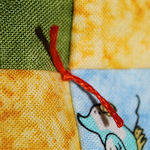
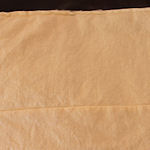 For the backing, I recommend a nice, soft flannel for a hospital bed. It will help keep the quilt from sliding off the bed, and it will be comfortable for the patient. I also used a flannel for the binding.
For the backing, I recommend a nice, soft flannel for a hospital bed. It will help keep the quilt from sliding off the bed, and it will be comfortable for the patient. I also used a flannel for the binding.
